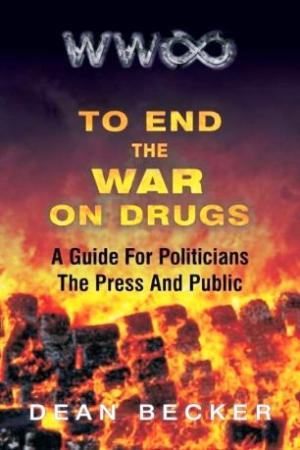To End the War on Drugs: A Guide for Politicians, the Press, and Public by Dean Becker (2014, DTN Media, 340 pp., $19.95 PB)

(Just last week, Becker put out a special "Policy-makers edition" of the book for this purpose.)
Becker is convinced that if the politicians just understood how horribly wrong-headed and misguided drug prohibition is, they would see the error of their ways and repent. I'm not sure I share his trust in the power of truth to overcome hide-bound thought processes and entrenched interests, but To End the War on Drugs is chock-full of argument and information that will be of great use to anyone seeking an understanding of how far off-the-rails our prohibitionist drug policies have taken us.
To End the War on Drugs is a compilation (and, hopefully, not the culmination) of Becker's 15 years in the trenches of what I call drug reform movement journalism. By that I mean reporting that seeks to accurately portray the effects of drug prohibition as well as the battles to change the drug laws, but which is informed by a certain editorial perspective. That perspective is that the drug war is a disaster.
When I first started covering the drug war for the Chronicle 13 years ago, I was almost alone in providing systematic coverage. There was High Times, but there weren't the dozens of marijuana-related magazines and hundreds of pot-related blogs that there are now. There wasn't much interest in marijuana reform in the mainstream media, let alone much concern about prison overpopulation, racism, and law enforcement militarization. The blogosphere was in its infancy. It was a pretty lonely beat, but Dean Becker was there.
He's been at it since 1999, creating his own movement journalism version of a media empire, beginning with the Drug Truth Network's Cultural Baggage radio shows broadcast from Houston's Pacifica radio station, which currently airs on around a hundred stations, and now including the Unvarnished Truth TV program. At the same time, Becker has also been an activist, working with the Drug Policy Forum of Texas and once heading Houston NORML.
The words of those Becker interviewed for the programs form the bulk of To End the Drug War. The book contains excerpts from interviews with more than a hundred people involved in the drug war or in ending it, including politicians, cops, lawyers, judges, researchers, scientists, and even other journalists (including yours truly, whose comments on the Mexican drug war a few years ago warranted a few pages). There is plenty of ammunition in there for folks seeking to demolish drug prohibition.
And that's exactly what Becker wants to do. He makes no bones about it. The interview excerpts make up the bulk of the book, but they are divided into various topics, with Becker providing an introductory page or two for each topic, and that's when Dean gets to shine. Journalists are usually doing the listening, not the talking -- watch out when we get a chance to say what's actually on our minds!
In his mini-essays, Becker makes it crystal clear that his mission, his obsession, his over-riding goal, is to drive a stake through the heart of the drug war. His is a demand for freedom and justice, and he is happy to leave the hesitations, the equivocations, and the qualifications to others. And he doesn't pull a lot of punches.
"Incrementalism" is, in Becker's view, a trap, a detour, a diversion. Drug prohibition, with all its horrors, has gone on more than long enough, and half-measures like drug decriminalization are not sufficient to end the evil. It is time to quit screwing around and end the drug war, he writes.
Similarly, while of course Becker wants marijuana legalization -- and he wants it now! -- he also understands that the drug war doesn't end with weed. It isn't white pot smokers who are filling our prisons, and legalizing weed isn't going to empty them out. It's going to take actually ending drug prohibition. Incremental measures such as sentencing reforms -- while a blessed relief to the victims of the drug war -- aren't going to end the injustice.
When it comes to drug prohibition, Becker is an absolutist. And I don't think that's a bad thing. To End the Drug War is his cri de couer. It deserves to be widely read, not only by those seeking ammunition to reinforce their policy positions on the drug war, but by those decision-makers and opinion-shapers at whom it is aimed.
This work by StoptheDrugWar.org is licensed under Creative Commons Attribution-ShareAlike 4.0 International
Add new comment